Paris Olympics: Au Revoir Emma McKeon As Aussie Girls Make One Final Splash After Record Breaking Week
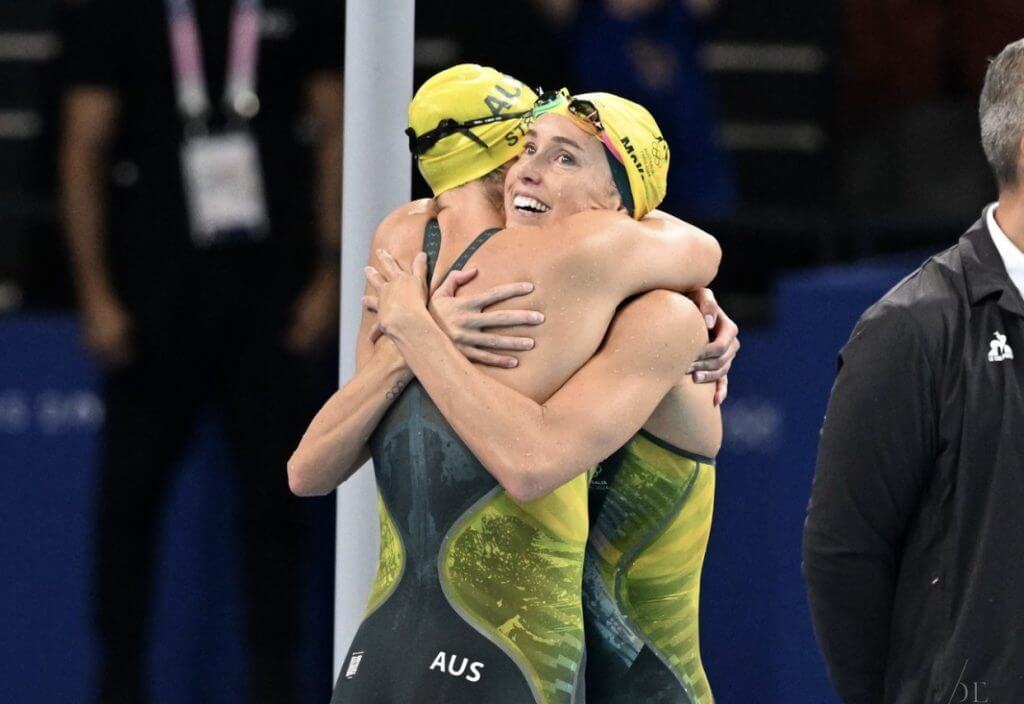
Paris Olympics: Au Revoir Emma McKeon Aussie Girls Make One Final Splash After Record Breaking Week In The Pool.
In an emotionally charged finale, Australia’s women have swum their way into the Olympic record books, celebrating with a collective “bomb” to finish off a spectacular week in the pool at the Paris La Defense Arena.
After collecting their silver medals in the 4x100m medley relay and with a typical show of Aussie larrikinism, and with our greatest Olympic larrikin, golden girl Dawn Fraser in the grandstand, the Aussie girls, Kaylee McKeown, Emma McKeon, Mollie O’Callaghan and Jenna Strauch launched themselves into the pool – with a flying leap, tracksuits and all.
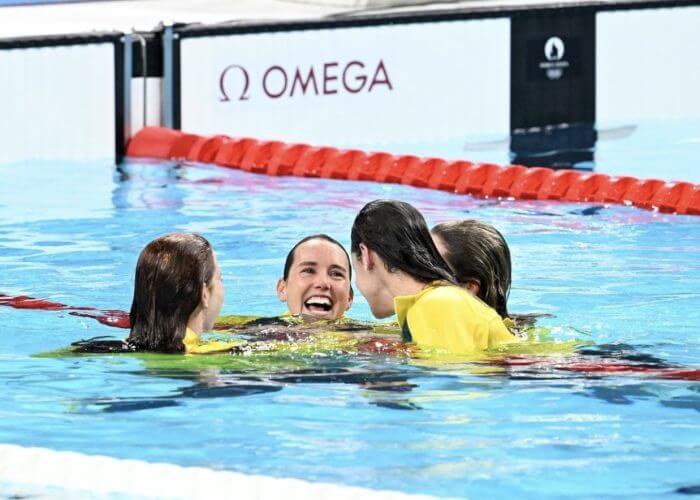
FINAL DUNKING: Emma McKeon and the AUS 4x100m medley relay team Photo Courtesy Delly Carr (Swimming Australia)
Urged on by McKeown the spur of the moment plunge, was not only to let off some steam after a pressure-cooker week that saw the Australian girls with a Midas touch, but also to celebrate the career of Australia’s greatest Olympic medal winner, McKeon.
The 30-year-old triple Olympian from Rio, Tokyo and Paris swam her final laps in the butterfly leg of the medley relay – the silver taking her overall medal tally to 14 (six gold, three silver and five bronze) – the most by any Australian athlete in the history of the Games – adding gold, silver and bronze from her Paris campaign.
And the smile said it all on McKeon’s face as she celebrated her stellar career alongside backstroking golden girl McKeown who finished the Games with five medals (two gold, one silver and two bronze) taking her overall Games tally to eight medals (five gold, one silver and two bronze).
McKeown sitting on top of the most individual gold medal list with four from her 100-200m backstroke double-double from Tokyo and Paris – ahead of fellow swimmers Ariarne Titmus, Ian Thorpe, Shane Gould, Dawn Fraser and Murray Rose, kayaker Jess Fox and track athlete Betty Cuthbert all with three each.
Titmus carving her own slice of history defending her 400m freestyle crown from Tokyo, winning her second gold with O’Callaghan, Lani Pallister and Bri Throssell (Shayna Jack and Jamie Perkins) in the women’s 4×200 and silvers in the 200 and 800m freestyles – taking her overall Olympic individual medal tally to six – three gold and three silver and her overall medal tally to eight.
O’Callaghan joined Titmus, Gould and Susie O’Neill when she won the 200m freestyle from world record holder Titmus – chiming in with golds in the 4x100m and 4x200m free relays;, silver in the 4x100m medley and bronze in the 4x100m mixed medley -a total of five medals in Paris from three gold, one silver and one bronze.
The 20-year-old has an overall Olympic medal total of eight adding in her three relay medals as a heat swimmer (two gold and one bronze) from Tokyo.
And it was O’Callaghan’s anchor leg with a sizzling split of 51.83, swimming the Australians past China and Canada, that took the girls from fourth into the silver medal position – maintaining Australia’s podium record in the relay for the last eight Games since Atlanta in 1996 with three gold and five silver v the USA five gold and three silvers.
The US taking Paris gold in a new world record with China the bronze –breaking the gold medal deadlock, taking the USA to eight gold after Bobby Finke’s amazing world record in the 1500m levelled the two teams on seven golds a piece.
The Americans saving their best till last after the Australians had given the world’s No 1 team something to chase – and the fright of their lives.
And in one of the most inspiring individual medal swims of the meet, Queenslander, Meg Harris, legally deaf after a childhood accident, produced the swim of her life to take the silver in the 50 metres freestyle behind world record holder, Sweden’s Sarah Sjoestroem.
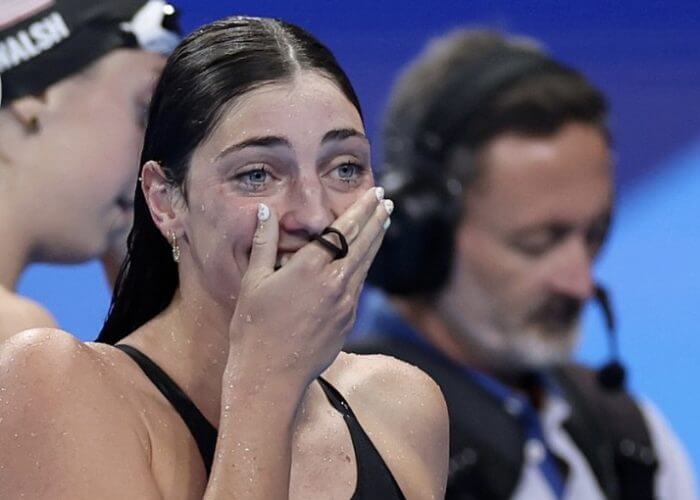
WHEN SILVER IS GOLD: Meg Harris after her silver medal-winning 50m freestyle Paris 24. Photo Courtesy Delly Carr (Swimming Australia)
Harris clocking her personal best time of 23.97 – history’s 11th fastest performer with Cate Campbell,McKeon, and Libby Trickett the only Australians ever to swim faster, admitting because of her deafness, she’s had to improve her starts.
McKeon won gold in 2020 in Tokyo, Campbell the bronze in Beijing in 2008 and Trickett the bronze in 2004 in Athens.
“I’ve always had to work on my start -I have a stronger finish so I had to make sure I was actually focusing on my race – about a great break out, a great swim and it all came together in the moment and I felt pretty good in the water,” said Harris, who also told Eddie McGuire on Channel 9 how she manages her starts with her hearing impairment.
“I have learnt for a while now, swimming for so long, I’ve had to train myself and listen to ‘take your marks and the go’ and with an incredible crowd like that it’s always hard but they have ‘take your marks’ coming from the speaker in the blocks and I have trained my self to go and I have a pretty good reaction, when (the field goes). I was very happy with the start and my time which was the first time under 24 seconds….”
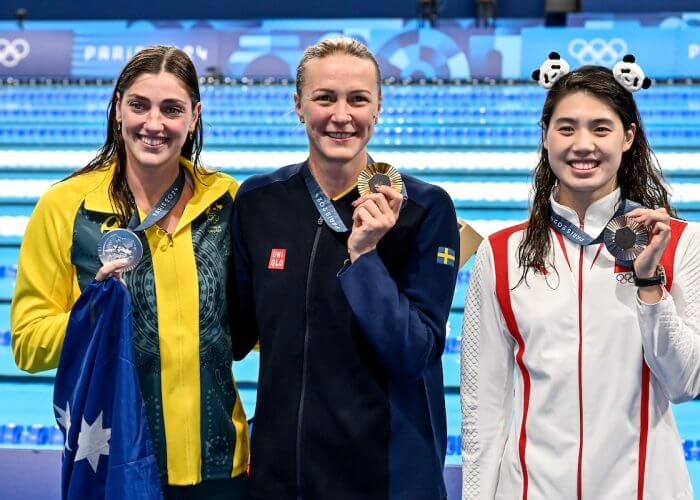
SHOW MEDALS: Meg Harris of Australia, silver, Sarah Sjoestroem of Sweden, gold, Yufei Zhang of China, bronze show the medals after competing in the swimming 50m Freestyle Women Final during the Paris 2024 Olympic Games at the Paris La Defense Arena. Photo Courtesy (DeepBlueMedia)
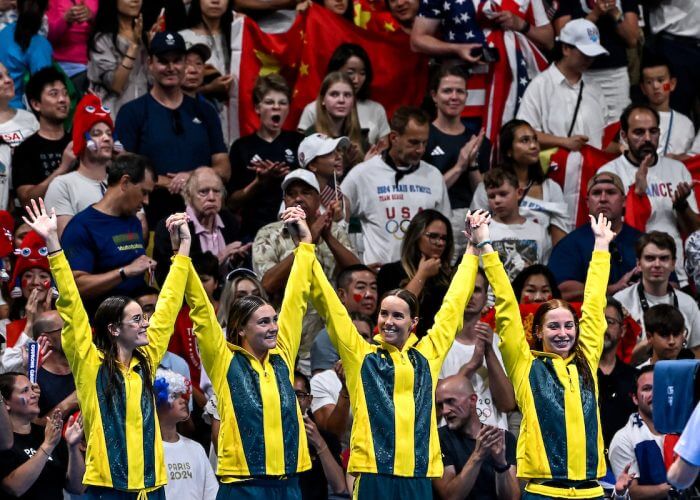
AU REVOIR FROM PARIS 2024: Kaylee McKeown, Jenna Strauch, Emma McKeon and Mollie O’Callaghan with one final Au Revoir after winning silver in the 4x100m medley relay at Paris La Defense Arena. Photo Courtesy (DeepBlueMedia)




An impressive group of female swimmers